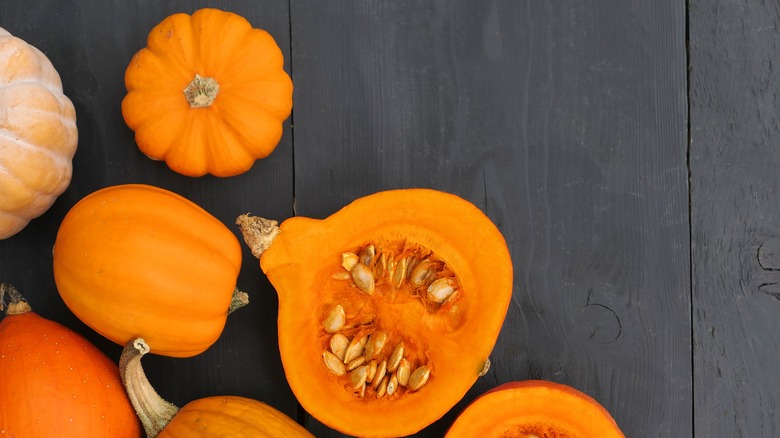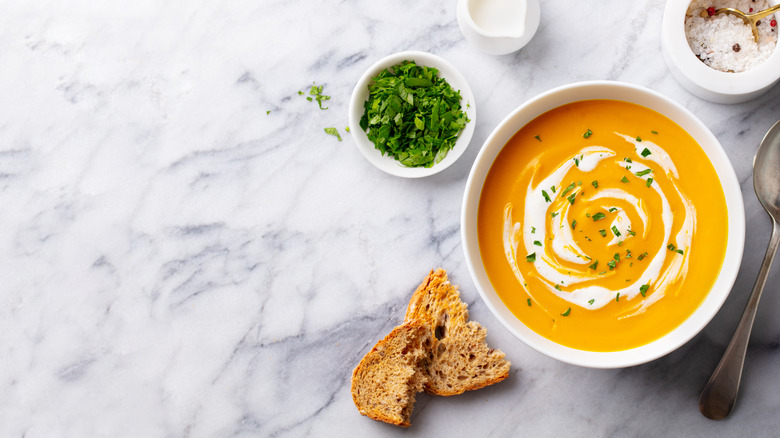Can Adding Pumpkin To Your Diet Help Control Breakouts?
The role of a pumpkin reaches far beyond Halloween and Thanksgiving celebrations, per Medical News Today. This brightly-hued vegetable has a surprising number of health benefits. It doesn't have a lot of calories and can be consumed in numerous ways, adds Healthline.
The name pumpkin has an interesting origin, reports University of California – from the Greek "peopon" (large melon) to the British "pumpion" and the more recent American term of "pumpkin." Did you know that there are almost 50 different kinds of pumpkins and that the vegetable — skin, flowers, leaves, seeds, and all — can be eaten in its entirety? It was in Mexico's Oaxaca Highlands that the "oldest domesticated pumpkin seeds" were found, and the vegetable is more than 7,500 years old (via PBS).
Eating a pumpkin has way more health benefits than you thought; the vegetable is a great source of beta carotene which helps reduce the risk of cancer and eye disease due to age (via Medical News Today). Its potassium and fiber content regulate blood pressure and the vegetable is also great to include in your diet if you're worried about diabetes. But did you know that pumpkins in your diet could also help control breakouts?
Pumpkins are great for skin health
While there are many reasons why you should be using pumpkin on your skin, consuming the vegetable in your diet can be extremely beneficial too, per Healthline. If you want to show your skin some love from the inside out, pumpkin-based recipes might be the way to go, adds Gameela Skin.
Vitamin C, beta carotene, and vitamin E are all essential nutrients that help us have healthy, glowing skin, according to BBC Good Food, and you can find all these and more in pumpkins. Clean skin is the ultimate dream for most people, and pumpkins in your diet can help you accomplish just that (via Women's Health). In addition to the inflammation fighting properties of beta carotene that help your skin heal from wounds faster, "raw and cooked pumpkin provides an excellent source of vitamin A and a good source of vitamin C, and both of these nutrients are great for skin health [to soften and smooth dry patches]," shares Michigan-based registered dietitian nutritionist Kiran Campbell. Did you know that pumpkin seeds are a superfood when it comes to controlling breakouts? (via Well Daily) Their high zinc content combined with vitamin E fights acne, per Clarity RX.
Worried about sun damage to your skin? The nutrients found in pumpkins (beta carotene and vitamin A) protect you against that too, per Women's Health.
How to consume pumpkin in your diet
Dietitian Julia Zumpano shares that there are a number of ways in which you can include pumpkin in your everyday diet, per Cleveland Clinic. There is no need to reserve this orange bundle of goodness just for Thanksgiving or Halloween. There's puddings you can make, smoothies you can whip up, pumpkin soups you can cook up using the canned version of the vegetable, or you can simply throw them in the oven for a few minutes. Don't forget that they also make great additions to muffin and pancake mixes.
Chef and food entrepreneur Justine Kelly says that it's best to stick with the fresh kind when you're opting to make savory dishes using the vegetable, "because you usually want to have chunks of pumpkin in the dish," according to Women's Health.
As for the seeds, you can add them to salads, bake with them, or simply snack on them when you're hungry, reports Well Curve. Just be cautious when you're consuming the shelled kind, as they can be hard on your digestive tract (via Health). New York-based registered dietitian Marissa Menshulam adds that the vegetable's solid amount of fiber "could create gas and bloating in individuals who are not used to a high-fiber diet," per Women's Health.


